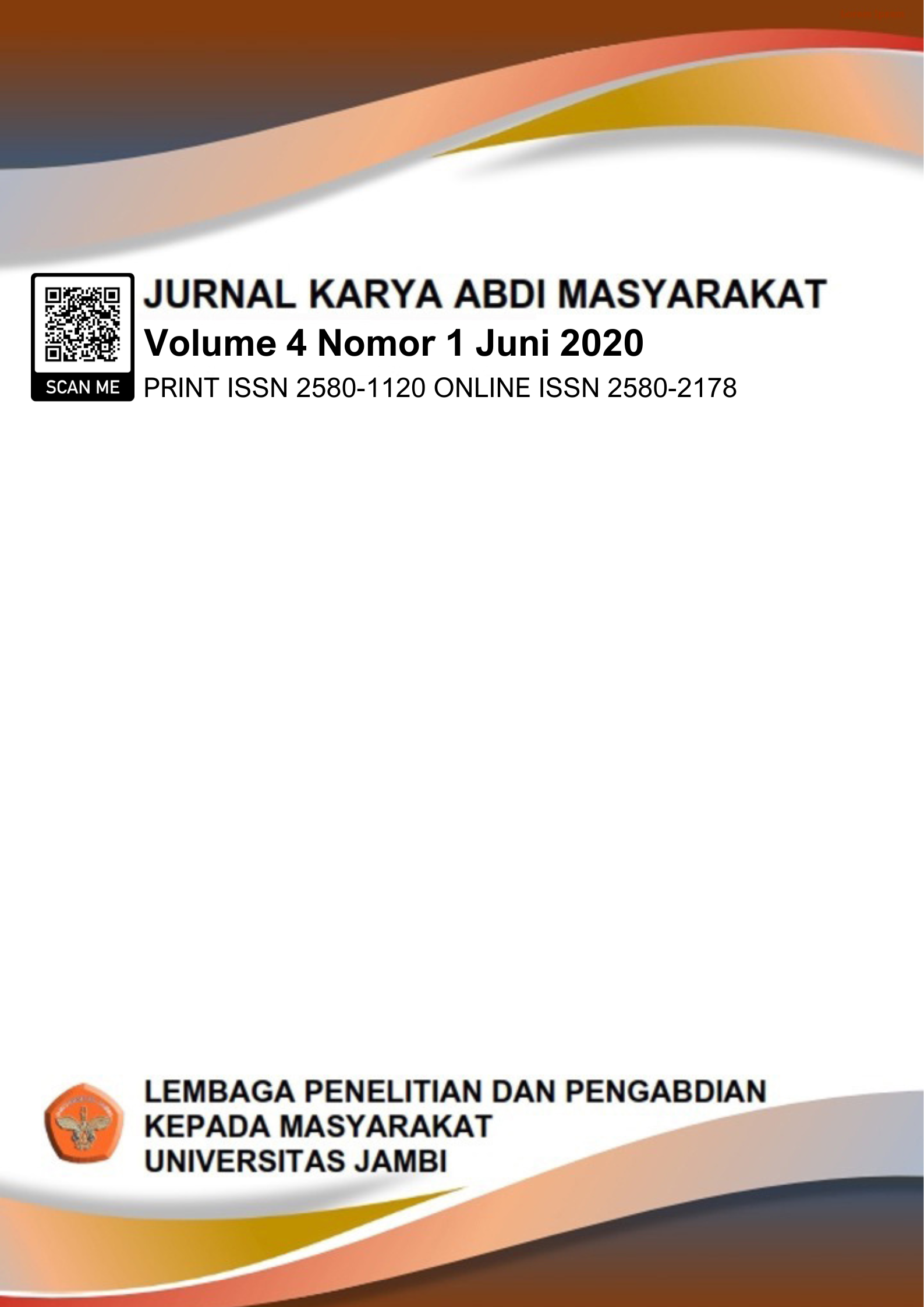Ppm Himae Dalam Memproduksi Trichokompos Berbasis Sampah Organik Kampus
DOI:
https://doi.org/10.22437/jkam.v4i1.9823Abstract
Kegiatan ini bertujuan meningkatkan pengetahuan dan ketrampilan mitra melalui pendampingan, penyuluhan dan demontrasi tentang tehnik pengolahan sampah organik dengan bahan baku sampah organik yang ada disekitar lingkungan kampus Universitas Jambi menjadi trichokompos. Metode yang digunakan adalah penyuluhan, pelatihan dan demontrasi kepada kelompok HIMAE sebagai mitra dalam hal mengolah sampah-sampah organik yang ada dilingkungan kampus menjadi trichokompos, sehingga dapat dimanfaatkan sebagai pupuk dan juga dapat berdampak terhadap lingkungan yang bersih dan indah. Tim pengabdian juga akan memberikan cara cara untuk meningkatkan nilai jual produk dengan cara membuat kemasan dan mencantumkan kandungan trikompos yang dihasilkan. Diharapkan dari upaya tersebut produk trikompos yang dihasilkan dapat dijadikan sebagai kegiatan wirausaha yang bernilai ekonomi bagi HIMAE. Hasil yang didapat dari kegiatan ini adalah meningkatnya pengetahuan mitra tentang pentingnya kegiatan pengolahan sampah organik kampus untuk mengelola kebersihan lingkungan. Sampah yang tadinya hanya merupakan limbah yang tidak punya nilai ekonomi dapat diolah menjadi kompos yang mempunyai nilai tinggi. Kompos yang dihasilkan dapat di pasarkan sehingga bisa dijadikan salah satu kegiatan wirausaha bagi HIMAE.
Downloads
Downloads
Published
How to Cite
Issue
Section
License
Please find the rights and licenses in Jurnal Jurnal Karya Abdi Masyarakat (JKAM).
- License
The non-commercial use of the article will be governed by the Creative Commons Attribution license as currently displayed on Creative Commons Attribution 4.0 International License.
- Authors Warranties
The author warrants that the article is original, written by stated author(s), has not been published before, contains no unlawful statements, does not infringe the rights of others, is subject to copyright that is vested exclusively in the author and free of any third party rights, and that any necessary written permissions to quote from other sources have been obtained by the author(s).
- User Rights
JKAM's spirit is to disseminate articles published are as free as possible. Under the Creative Commons license, JKAM permits users to copy, distribute, display, and perform the work for non-commercial purposes only. Users will also need to attribute authors and JKAM on distributing works in the journal.
- Rights of Authors
Authors retain the following rights:
- Copyright, and other proprietary rights relating to the article, such as patent rights,
- The right to use the substance of the article in future own works, including lectures and books,
- The right to reproduce the article for own purposes, provided the copies are not offered for sale,
- The right to self-archive the article.
- Co-Authorship
If the article was jointly prepared by other authors, the signatory of this form warrants that he/she has been authorized by all co-authors to sign this agreement on their behalf, and agrees to inform his/her co-authors of the terms of this agreement.
- Termination
This agreement can be terminated by the author or JKAM upon two months notice where the other party has materially breached this agreement and failed to remedy such breach within a month of being given the terminating party notice requesting such breach to be remedied. No breach or violation of this agreement will cause this agreement or any license granted in it to terminate automatically or affect the definition of JKAM.
- Royalties
This agreement entitles the author to no royalties or other fees. To such extent as legally permissible, the author waives his or her right to collect royalties relative to the article in respect of any use of the article by JKAM or its sublicensee.
- Miscellaneous
JKAM will publish the article (or have it published) in the journal if the articles editorial process is successfully completed and JKAM or its sublicensee has become obligated to have the article published. JKAM may conform the article to a style of punctuation, spelling, capitalization, referencing and usage that it deems appropriate. The author acknowledges that the article may be published so that it will be publicly accessible and such access will be free of charge for the readers.








